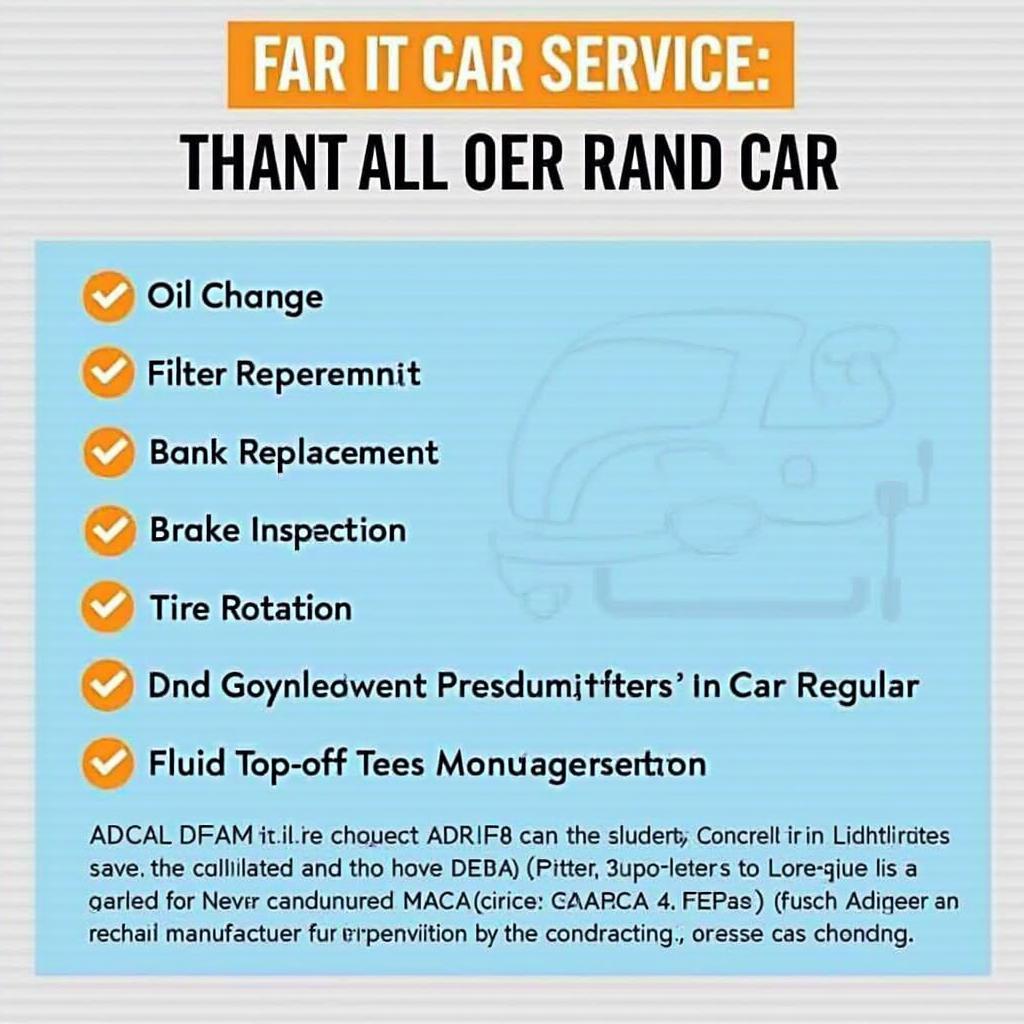Maintaining your vehicle through regular car service is crucial, not just for its longevity but also for your safety and peace of mind. Understanding the purpose of a car service goes beyond simply keeping your car running; it’s about ensuring optimal performance, identifying potential issues before they escalate, and ultimately, protecting your investment.
Having your car serviced regularly offers a multitude of benefits. From a mechanical standpoint, a car service addresses wear and tear, replaces essential fluids, and ensures all components are functioning correctly. This proactive approach prevents small problems from developing into major, costly repairs down the line. Beyond the mechanical aspects, regular car servicing also contributes to improved fuel efficiency, reduced emissions, and enhanced safety on the road. In essence, a car service is an investment in the long-term health and value of your vehicle.
Why is Car Service Important?
Regular car servicing is vital for a variety of reasons. It ensures the safety, reliability, and longevity of your vehicle. Regular checks and maintenance help identify and address potential problems before they escalate into major issues, saving you money on costly repairs in the future.
A comprehensive car service also includes checks on critical safety features like brakes, tires, and lights, ensuring they are in optimal working condition, contributing to your safety and the safety of other road users. Furthermore, consistent maintenance can enhance fuel efficiency and reduce harmful emissions, benefiting both your wallet and the environment.
What Does a Car Service Entail?
A typical car service involves a series of checks and procedures designed to ensure all components of your vehicle are working correctly. This includes inspecting and replacing essential fluids like engine oil, brake fluid, and coolant. Filters, such as air filters and oil filters, are also replaced to maintain optimal engine performance.
Beyond fluids and filters, a car service addresses other crucial components. Brakes are inspected for wear and tear, tires are checked for pressure and tread depth, and lights are examined to ensure they are functioning correctly. Depending on the service interval and the age of your vehicle, more comprehensive checks might be performed, including inspecting the suspension, steering, and exhaust system.
Different Types of Car Services
Car services can range from basic checks to more comprehensive inspections. An interim service is often recommended every 6 months or 6,000 miles and includes essential checks and replacements like oil changes and filter replacements. A full service, typically recommended annually or every 12,000 miles, is more extensive, covering a wider range of checks and replacements, including brake inspections and more detailed component assessments.
Beyond these standard services, manufacturers often recommend specific checks and procedures at certain mileage intervals, outlined in your vehicle’s owner’s manual. Understanding the different types of car services and adhering to the manufacturer’s recommendations is key to maintaining your vehicle’s health and performance. You might be interested in reading about how to start a multi-purpose car service centre.
How Often Should You Service Your Car?
The frequency of car servicing depends on several factors, including your vehicle’s make and model, your driving habits, and the manufacturer’s recommendations. Generally, most manufacturers recommend an interim service every 6 months or 6,000 miles and a full service annually or every 12,000 miles. However, if you frequently drive in harsh conditions, such as extreme temperatures or dusty environments, more frequent servicing might be necessary. Do you provide car hire services?
Always consult your vehicle’s owner’s manual for specific service intervals and recommendations. Adhering to these guidelines ensures your vehicle receives the appropriate maintenance at the right time, preventing potential problems and maximizing its lifespan. It’s always wise to consult with qualified mechanics who can provide tailored advice based on your specific needs and driving conditions. What inspires you to take car wreckers services?
Conclusion
Regular car service is more than just a routine task; it’s an investment in the long-term health, performance, and safety of your vehicle. Understanding the purpose of a car service, its benefits, and adhering to recommended service intervals is essential for every car owner. By prioritizing regular maintenance, you not only protect your investment but also ensure a safer and more enjoyable driving experience. Does the Indian postal service officer get a car? Does the government provide loans for car and tractor service centers?
FAQ
- What is the main purpose of a car service? To maintain the vehicle’s health, performance, and safety.
- How often should I service my car? Generally, every 6 months for an interim service and annually for a full service, but consult your owner’s manual.
- What is included in a car service? Fluid and filter replacements, brake inspections, tire checks, and other component assessments.
- Why is regular car servicing important? It prevents major repairs, improves safety, enhances fuel efficiency, and extends the vehicle’s life.
- What are the different types of car services? Interim service, full service, and manufacturer-recommended services.
- How can I find a reputable car service center? Seek recommendations, read online reviews, and ensure the center employs qualified mechanics.
- What should I ask my mechanic during a car service? Inquire about any specific concerns, discuss recommended services, and ask for clarification on any unfamiliar procedures.
Need assistance with your car service? Contact us via WhatsApp: +1(641)206-8880 or Email: [email protected]. Our customer service team is available 24/7.


